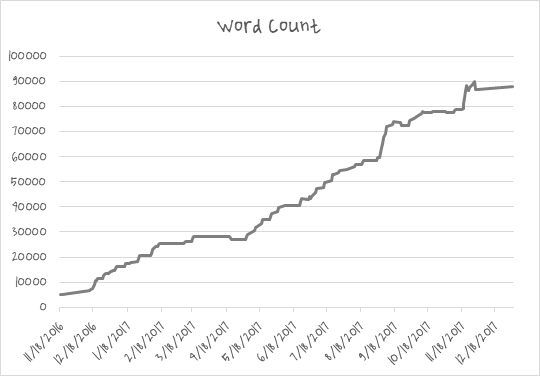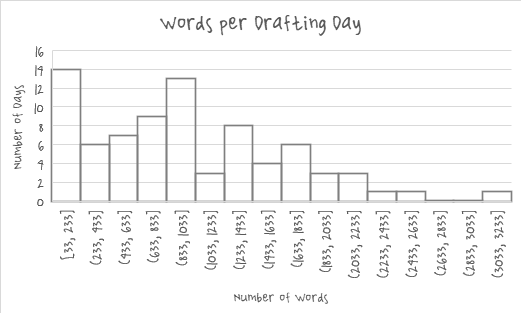 Recently I posted about getting my book deal. Now I want to share about the process of writing the book. I hope this post will help you get excited to write your own book and I hope it will help you avoid some of the mistakes I made along the way.
Recently I posted about getting my book deal. Now I want to share about the process of writing the book. I hope this post will help you get excited to write your own book and I hope it will help you avoid some of the mistakes I made along the way.
First – writing a book is a lot of work. Mine took just about every weekend, holiday, and vacation day for twelve and half months, Nov 2016 through Jan 2018. That was about 80 working days to produce the first draft, and another 36 days to edit that draft into final form. Some of those days were productive, some were miserable, but that’s what it took.
And I don’t think I could do it much faster if I had to do it again.
Cast of Characters
Writing is a solitary activity, and I wrote most of my book alone in a quiet room or in a coffee shop (with headphones on). But the day I got the book deal I also got a support team. The direct members of this team were:
- The acquisitions editor – who’d made the deal with me (see my blog post on that). At this point I think her job was to make sure that the product I delivered was close enough to what was in the contract so that her management wouldn’t be grumpy with her (and/or fire me). She also dealt with a couple small contract changes we needed to make. Not much direct involvement in the content of the book.
- The coordinating editor – who was great. Her job was to make sure I understood what I needed to do and that I was doing it in a timely fashion. She helped me with the chapter submission process, the formatting, the dates and deadlines. She also helped get critical questions answered when other participants were busy (or had my emails eaten by their spam filters).
- The developmental editor – who was supposed to help if my writing skill, my ability to organize the content, or my general communication style weren’t cutting it.
- The copy editor – who corrected all the grammar, spelling, and technical style issues (like the proper use of colons before bulleted lists, which I still think is done by flipping coins, although several smart people have told me otherwise).
- The technical editor – who I got to select. He was someone I worked with for many years, another expert in the field. His job was to make sure I didn’t get anything (too) wrong.
- The production people – who typeset the thing, produced the cover image, did legal stuff and whatever else. I’m not sure what else, but I know there was more work done by people I didn’t have direct contact with.
Having all these people watch me write was odd. It was a weird sort of pressure, lots of folks looking over the shoulder. I wasn’t expecting it and having all of them and a deadline did make the process of writing a little less fun.
Although without them I wouldn’t have been able to publish a book…
So I’m grateful for all that they did.
Milestones
I had four major milestones to hit. Unfortunately I didn’t know what or when they all were ahead of time, exactly. My sense is that most authors don’t hit the milestones the publisher would like, so publishers don’t always bother to set all the milestones all out at the start. Rather, they set one or two, see where the author ends up, then set the next ones based on that and other business needs.
I actually hit every milestone (although one of them was particularly miserable), but in retrospect, I don’t think I had to. I think I could have asked for more time and the publisher would have gladly given it.
Whatever. It got done. The milestones were:
8/1/2017 – first three chapters
Early July I had the contract in hand. The publisher wanted three chapters in a month. I interpreted this as another audition. If they chapters weren’t good, they might cancel the deal, so I spent the time to do a good job.
When I submitted the first three, the acquisition editor and the developmental editor read them. Between the two of them, they left about four minor comments in the doc. The acquisitions editor said the chapters were great.
That’s the last I heard of the developmental editor.
Seriously. She was peace out!
My interpretation is that they decided my product met their quality bar and they put the developmental editor on other projects. They probably saved some money. Fine. I’m not sure if it was a mistake on my part to polish these chapters so much. If I hadn’t the developmental editor might have stuck around, and I’m sure I would have ended up with a better book if I’d had her involvement.
Oh well!
12/31/17 – manuscript completion
This milestone was for the first draft of the entire book. Leading up to this deadline I submitted chapters as I thought they were at first draft quality. I talked to the coordinating editor a bunch, particularly every time I wanted to add or cut a chapter (or anything that would change the official table of contents). She made sure I was roughly on track, suggesting ‘soft milestones’ for how much content I should have at various points.
I think the biggest problem I encountered during this milestone was the length of the book. My word count came out just about where I said it would, but the number of pages was less than the publisher expected. This happened because I had very few figures or code listings. For a short while I thought I was going to have to figure out how to make 50 pages of padding. I even came up with about 30 illustrations (which the publisher didn’t like at all and vetoed).
Thankfully, they decided to take the book as I wrote it (good on word count, but short on page count).
1/8/2018 – author revisions
And here was my big mistake. I knew I was going to have a draft by 12/31. I knew I would have to do another pass on the book, because my first drafts are a bit sketchy. But I didn’t bother to ask how long I had to do this second pass.
Answer? One week.
Hah!
Impossible.
I don’t know why they thought this could work. Maybe they just said any random date and expected me to negotiate. Maybe most authors interpret ‘first draft’ differently than I do and submit more-polished first drafts. Or maybe the publisher had an opportunity to hit some release window if I could make that date, so they took a shot.
I don’t know.
I found out this was the deadline around thanksgiving time. From that point I had about five weeks to finish draft one, do draft two, and incorporate all the comments from my technical editor. I decided to just…do…it…
So I took some extra vacation days. I worked on my Hawaii trip (which is fine, because I would have worked on something else if I didn’t have the book to work on). In the end, I submitted the first draft early on 12/4/2017. And I submitted the final draft on 1/4/2018.
But I probably should have done something differently, because I was pretty burned out by the end.
2/20/2018 – review copy edits
For the month of Jan I did nothing (on the book). Then on Feb 10th they sent me to a website where I could review the copy edited version of the book. The webpage was some weird web based workflow, no track changes, no word processor I was used to…hrm.
At this point I was supposed to check the layout and styling elements. I was also supposed to make sure they hadn’t made changes that changed the meaning of anything.
I tried to compare to the version I submitted, to find what and how much they changed, but it was pretty much impossible. All I could really do was read it.
In the end I think I had a couple small comments, but I pretty much just went with what they had, which worked out fine.
My process for writing the book
When I’m writing I try to write every weekend day, every vacation day, and every holiday. I set a word target and I work until I produce that many new words or until about six hours is past, whichever comes first. I’ve tried writing on work days before or after work, but I’ve never had success with that. It makes me too tired.
For fiction my word target is 2,000 words. But this book was much harder for me, so I lowered my target to 1,000 words per day.
I also track my writing, recording the date and the word count after every writing session. As I said, I recorded 80 days drafting and 36 days editing. There were a few more writing days before I started recording, while I was conceptualizing, but I didn’t track those.
The following figure shows the word count progress for this book. I made slow progress the first few months, because I didn’t have the book deal yet, so I wasn’t hyper focused on the writing. Then about May I started working regularly. The bursts of output in September and November were made possible by taking vacation days from work. And December 2017 was all editing, so the word count didn’t move as much.

I think this book was harder to write than fiction because I struggled to get an outline that flowed and explained concepts in order and in the right detail.
Most chapters I started writing by describing three related concepts simultaneously (because they were related in my brain). So my rough drafts were usually a mess. Then I had to step back and realize what I was actually trying to say. Then I had to rewrite three sections for the three concepts. Sometimes the concepts didn’t all fit in the same chapter, so it kind of messed up other things.
The writing wasn’t the hard part. The thinking it through and organizing it was.
This following chart shows a breakdown of the word count I was able to get across the 80 days of writing. Fourteen days that were basically failures – less than 233 words! A few days that were great – over 2,000 words.

My average editing day added just 228 words to the manuscript. Eight of the editing days had negative word counts. One editing day I deleted over three thousand words.
Ugh.
Summary
Writing takes me a lot of time. I think I’m a bit slower than other writers, but not crazy slow. Finishing a book is a real grind.
But I love it. I love engaging my whole brain in the writing process, working really hard, and producing something that I’m proud of.
And it’s very nice to think that my effort might help others. I hope this book does help people be more productive at machine learning and produce amazing things.
I hope this post inspires you to write your book and to finish it easier than I did.